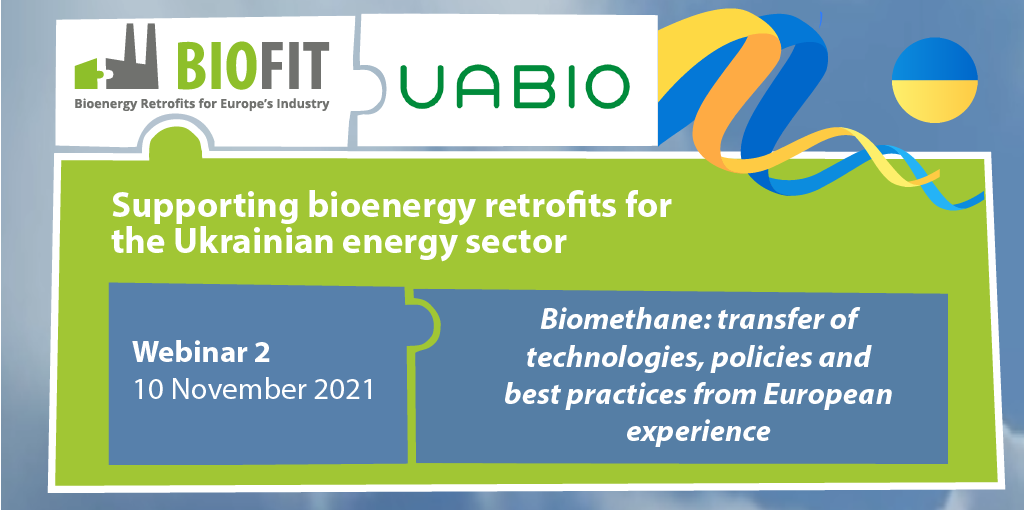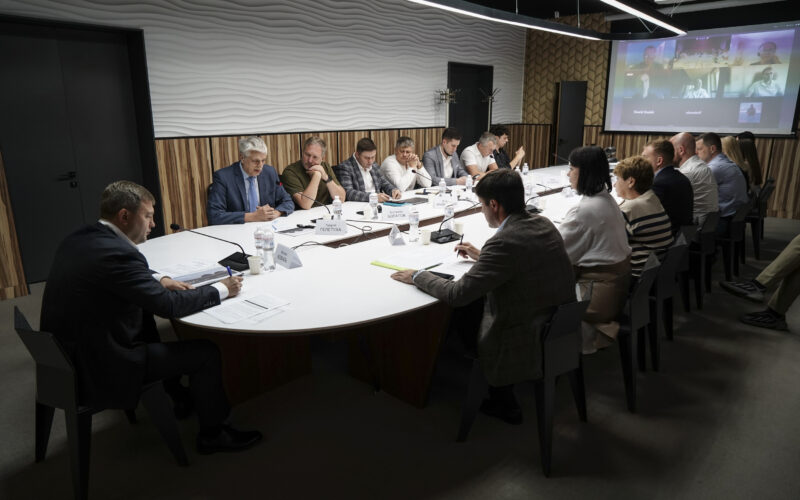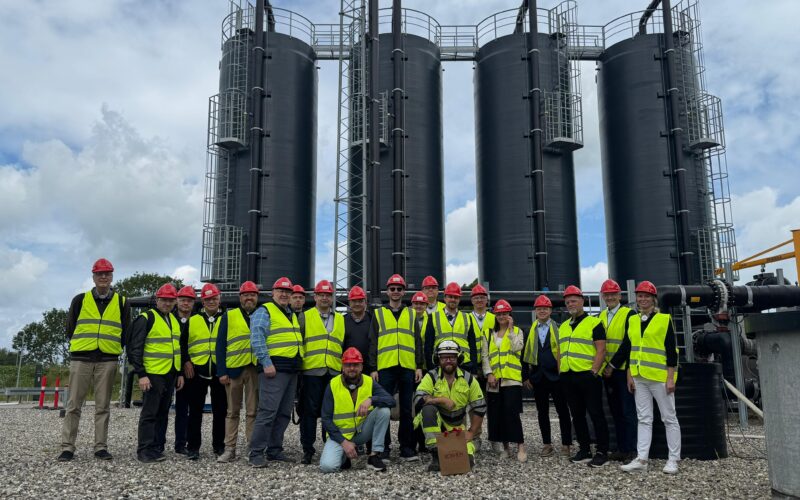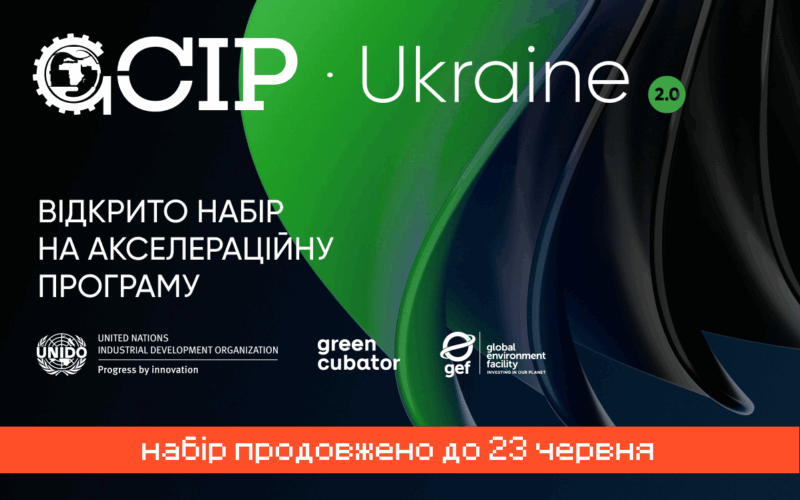Materials of the webinar «Biomethane: transfer of technologies, policies and best practices from European experience»
On November 10, 2021, the Bioenergy Association of Ukraine together with the BIOFIT project held the second webinar “Biomethane: transfer of technologies, policies and best practices from European experience” from the series of webinars “Supporting bioenergy retrofitting of the energy sector of Ukraine”. The main goal of the webinar series is to promote cooperation and exchange between European industry and private sector players with stakeholders from research, industry, and the public sector in Ukraine regarding increasing uptake of bioenergy.
The event was attended by 141 participants (among 229 registered) from various categories of stakeholders: representatives of the universities, profile associations, local governments, local state administrations, representatives of local communities, business, research institutions, NGOs, Agri companies, finance institutions, energy companies and other.

The overall aim of the BIOFIT project is to facilitate the introduction of bioenergy retrofitting in the following five industry sectors: first-generation biofuels, pulp, and paper, fossil refineries, fossil-firing power, fossil power, heat, and CHP plants.
During the webinar, seven speakers shared their experience and knowledge with the Ukrainian audience to support the market uptake of biomethane in Ukraine. Manolis Karampinis (Research Associate, Centre for Research and Technology Hellas – CERTH) briefly introduced the BIOFIT project and highlighted how the growing political importance of natural gas as a transition fuel in Europe also opens the door for renewable gases, such as biomethane and green hydrogen.
Georgii Geletukha (Head of Board, Bioenergy Association of Ukraine – UABIO) presented the very positive prospects for biomethane production in Ukraine considering the huge feedstock availability in the country. The adoption of the national law on biomethane is very positive and very recent – signed just one day before the webinar. UABIO is actively supporting the development of the sector through participation in related projects: the H2020 REGATRACE project regarding the establishment of an efficient trade system based on issuing and trading biomethane/renewable gases Guarantees of Origin (GoO) and a project funded by EBRD on biomethane plants zoning, taking into account the feedstock availability location and connectivity to the gas transmission and distribution network of Ukraine.
Dirk Bonse (Head of Division “Renewable Gases”, Fachverband BIOGAS / German Biogas Association) gave an overview of the biogas & biomethane status in Germany, which despite a current saturation remains the largest in Europe. Different operator and business model concepts for biomethane have emerged, with its use as a transport fuel as bio-CNG in passenger cars and light vans growing increasingly in popularity. In the future, the transportation fuel market is expected to be mostly driven by liquefied biomethane for heavy goods traffic and maritime or inland waterway traffic. Developments are strongly influenced by policy – RED II and the Fit-for-55 package provide great opportunities for trading of GHG certificates from biomethane production.
Video of the event
Dominik Rutz (Head of the Bioenergy & Bioeconomy Unit, WIP Renewable Energies) introduced DiBiCoo, a H2020 project that aims to facilitate collaboration between European biogas industries & stakeholders from emerging and developing markets. Although the project demonstration activities focus on non-European countries, most other outputs of the project are available and can be of use to Ukrainian stakeholders – the Biogas and Gasification Matchmaking Platform, study tours, training courses and webinars.
Michael Beil (Deputy Head of Bioenergy System Technology department, Fraunhofer Institute for Energy Economics and Energy System Technology IEE) focused on the technical aspects of the upgrading of biogas. Five different technological methods are considered as state-of-the-art and have relevant market shares in Germany and worldwide: pressure swing adsorption, water scrubber, physical absorption with organic solvents, chemical absorption with organic solvents and high pressure membrane separation. An assessment of the characteristics and performance of each method in terms of energy & water demand, methane loss, biogas desulphurization requirements and other requirements was given, highlighting that there is no single technology suitable for every kind of project. In addition, key points regarding the reduction of emissions through lean-gas treatment and the current requirements for injection in the grid were presented.
The two final presentations of the webinar were delivered by speakers representing two of the large European technology and service providers for biogas / biomethane plants.
Alexey Mozgovoy (Business Development Manager International Biomethane) from PlanET Biogastechnik presented different company references related to biomethane production, with varying capacities and applicable to different conditions. Mr Mozgovoy also briefly discussed the different business concepts that can be adopted by biomethane plant projects and highlighted that biomethane may also have a role to play in the production of renewable hydrogen, through the reforming of biogas (instead of natural gas).
Vladimir Bogatov (International Sales Manager) gave an overview of the experiences of WELTEC BIOPOWER, which celebrates its 20th anniversary this year. More specifically, four examples of the company’s references in Europe were presented, representing different types of substrates utilized, production capacities and end-uses of the biomethane produced.
The webinar was closed with a short panel discussion, addressing questions and remarks from the audience. The main conclusion is that the recent legislative developments in Ukraine, coupled with the abundance of biomass resources, provide good framework conditions for establishing a vibrant biomethane market that can cater to both domestic as well as European demand for renewable gases.
The event programme and all presentations are available on this link.

The BIOFIT project has received funding from the European Union’s Horizon 2020 research and innovation programme under grant agreement No 817999. The present document and workshop presentations reflect only the author’s view; the European Climate, Infrastructure and Environment Executive Agency (CINEA) is not responsible for any use that may be made of the information it contains.


